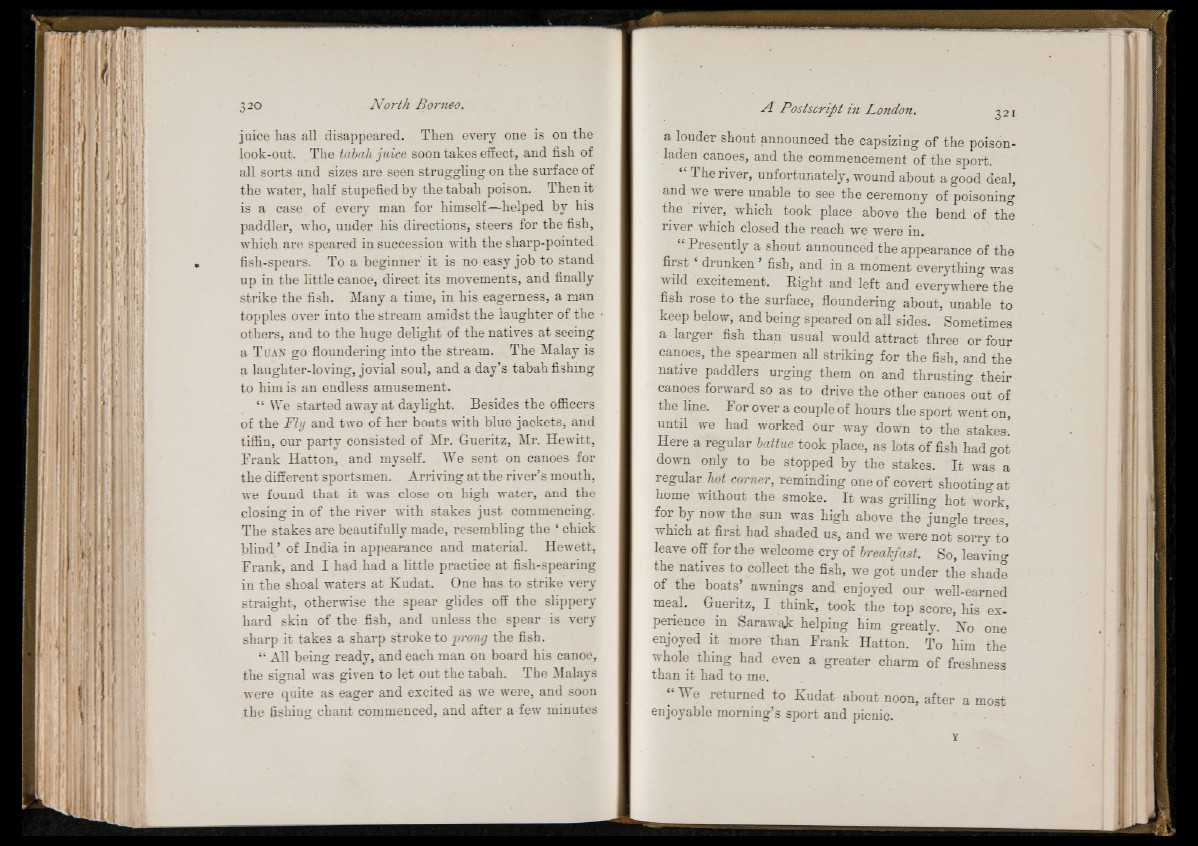
juice has all disappeared. Then every one is on the
look-out. The tabah juice soon takes effect, and fish of
all sorts and sizes are seen struggling on the surface of
the water, half stupefied by the tabah poison. Then it
is a case of every man for himself—helped by his
paddler, who, under his directions, steers for the fish,
which are speared in succession with the sharp-pointed
. fish-spears. To a beginner it is no easy job to stand
up in the little canoe, direct its movements, and finally
strike the fish. Many a time, in his eagerness, a man
topples over into the stream amidst the laughter of the
others, and to the huge delight of the natives at seeing
a T uan go floundering into the stream. The Malay is
a laughter-loving, jovial soul, and a day’s tabah fishing
to him is an endless amusement.
“ We started away at daylight. Besides the officers
of the Fly and two of her boats with blue jackets, and
tiffin, our party consisted of Mr. Gueritz, Mr. Hewitt,
Frank Hatton, and myself. We sent on canoes for
the different sportsmen. Arriving a t the river’s mouth,
we found that it was close on high water, and the
closing in of the river with stakes just commencing.
The stakes are beautifully made, resembling the ‘ chick
blind ’ of India in appearance and material. Hewett,
Frank, and I had had a little practice at fish-spearing
in the shoal waters at Kudat. One has to strike very
straight, otherwise the spear glides off the slippery
hard skin of the fish, and unless the spear is very
sharp it takes a sharp stroke to prong the fish.
“ All being ready, and each man on board his canoe,
the signal was given to let out the tabah. The Malays
were quite as eager and excited as we were, and soon
the fishing chant commenced, and after a few minutes
a louder shout announced the capsizing of the poisonladen
canoes, and the commencement of the sport.
The river, unfortunately, wound about a good deal,
and we were unable to see the ceremony of poisoning
the river, which took place above the bend of the
river which closed the reach we were in.
Presently a shout announced the appearance of the
first ‘ drunken ’ fish, and in a moment everything was
wild excitement. Bight and left and everywhere the
fish rose to the surface, floundering about, unable to
keep below, and being speared on all sides. Sometimes
a larger fish than usual would attract three or four
canoes, the spearmen all striking for the fish, and the
native paddlers urging them on and thrusting their
canoes forward so as to drive the other canoes out of
the line. For over a couple of hours the sport went on,
until we had worked our way down to the stakes.
Here a regular battue took place, as lots offish had got
down only to be stopped by the stakes. I t was a
regular hot corner, reminding one of covert shooting at
home without the smoke. I t was grilling hot work,
for by now the sun was high above the jungle trees,
which at first had shaded us, and we were not sorry to
leave off for the welcome cry of breakfast. So, leaving
the natives to collect the fish, we got under the shade
of the boats’ awnings and enjoyed our well-earned
meal. Gueritz, I think, took the top score, his experience
in Sarawak helping him greatly. Ho one
enjoyed it more than Frank Hatton. To him the
whole thing had even a greater charm of freshness
than it had to me.
“ We returned to Kudat about noon, after a most
enjoyable morning’s sport and picnic.
Y